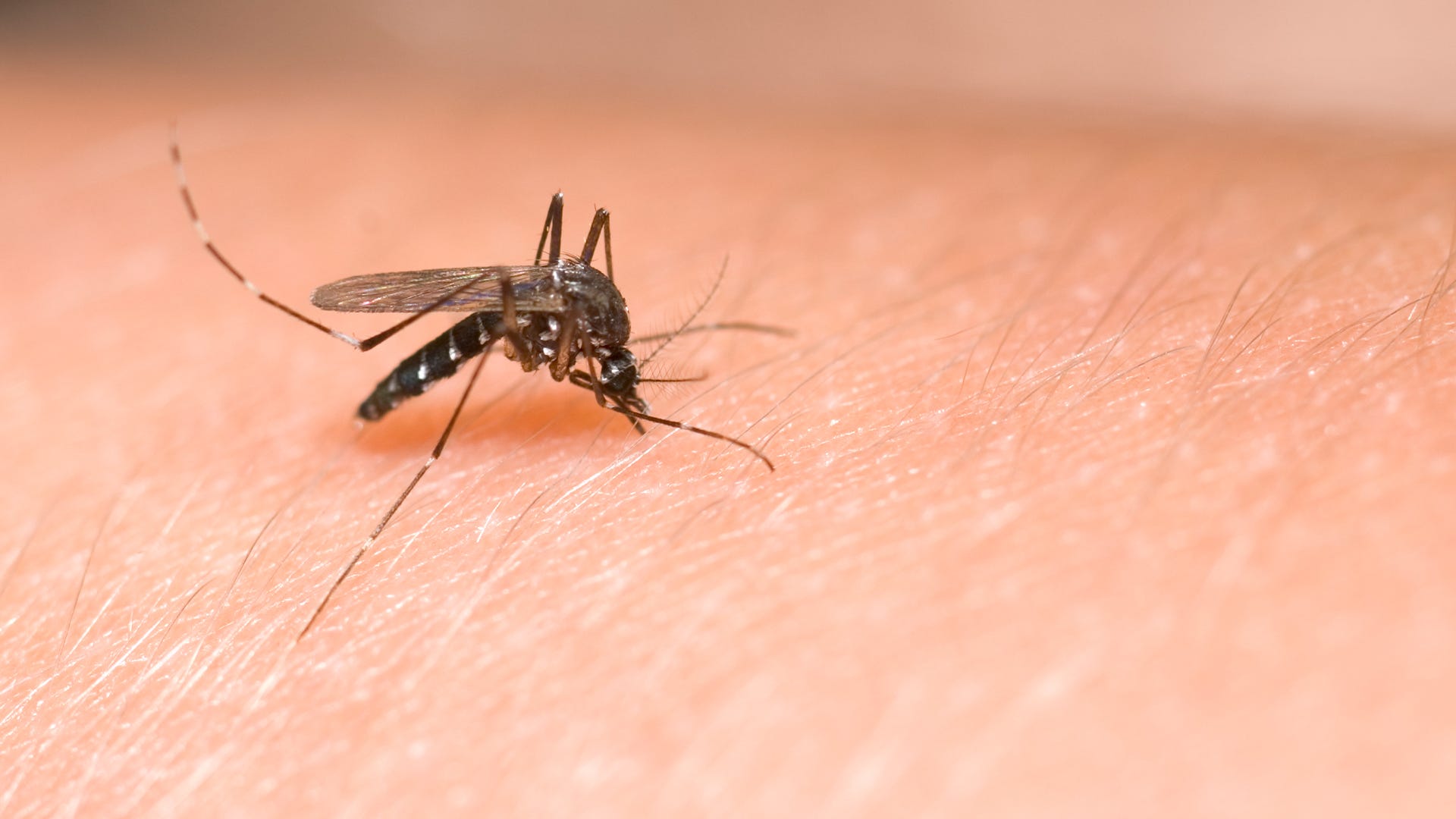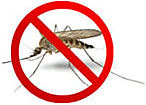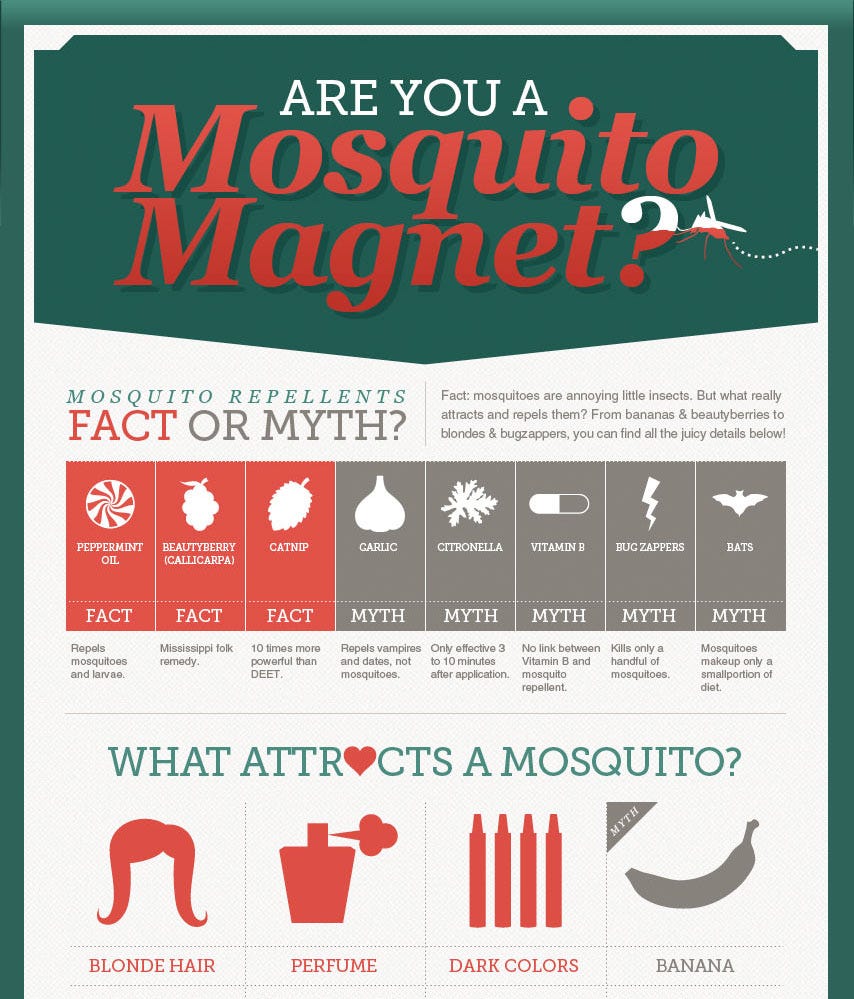
Battling mosquitoes seems to be an American pastime. Just like the weather, everyone likes to talk about it, but not many people know what to do about it! Some people spray themselves with chemicals. Others try folk remedies to keep the little biters away.

What works and what doesn’t? Mosquito Magnet® gathered the data – from scientific reports to old wives tales to help sort out the best mosquito solutions for you, your family and your yard. We weren’t surprised at the ultimate results though – CO2 mosquito traps, when placed properly and running 24/7 – are your best bet for mosquito protection.
We broke it all down in the graphic below! After you’re done reviewing that, keep reading! We’ll explain the results a little more.



Mosquito Repellents: Fact or Myth?
There are certain things that drive you so crazy that you’ll flee the situation – such as a loud noise or an awful smell. It seems natural to assume there are certain smells, sights or sounds that drive mosquitoes away, too. It’s true! What works and what doesn’t?

- Peppermint & Peppermint Oil – Humans generally like the smell of peppermint, but many animals do not. Mosquitoes appear to be among those that hate the smell. You’ve got a good eye if you have noticed that properties with a lot of mint growing have fewer mosquitoes. You can also try applying peppermint oil to your skin as a temporary repellent.
- Beautyberry – A long-known folk remedy for mosquitoes comes from a plant called beautyberry (Callicarpa Americana). In the past, farmers would take beautyberry leaves and tuck them under livestock harnesses to keep biting bugs away from their animals. Now scientists are exploring ways to use the plant to create natural repellents for humans. We will let you know if something helpful comes of the research.
- Catnip – The oil found in catnip, nepetalactone, is a highly effective mosquito repellent. Add this oil to a diffuser or mix it with a lotion to provide some repellent qualities. Of course, there’s an additional benefit beyond mosquito repellent – you can expect extra attention from your cat!
- Garlic – While garlic offers a pungent odor that even humans smell, there’s debate as to whether it repels mosquitoes. Whether you crush it and apply it to your skin or eat a lot of garlic-coated food during dinner, scientists say it really doesn’t do much to repel mosquitoes.
- Citronella – Yes, citronella does repel mosquitoes. The problem is that the effects are limited and last only a short time. Candles, the most popular citronella product, work, but a simple change of breeze can open you up to an attack from a determined mosquito.
- Vitamin B – There are multiple varieties of B vitamins, and none of them have proven to be an effective mosquito repellent. Of course, the B family of vitamins has plenty of other benefits, so don’t stop seeking them out!
What Attracts a Mosquito?
Like any hunter, mosquitoes rely on their senses to seek out their prey. By understanding what mosquitoes are looking for, we’ve learned to avoid them. Here are some known triggers for mosquito bites:
- Carbon Dioxide – Mosquitoes can detect the CO2 you expel as you breath. By following an airborne trail of CO2 , they can find a victim. CO2 mosquito traps trick mosquitoes into thinking they’re on the trail of a fresh victim. CO2 detection is probably the most important draw for mosquitoes.
- Body heat – Thermal sensory information is another way mosquitoes find their targets. It’s probably not considered a primary target indicator, since some mosquitoes will bite cold-blooded animals, including reptiles and other insects.
- Sweat – Human perspiration often produces a strong odor, and mosquitoes can detect it.
- Dark-colored clothing – When seeking out victims, mosquitoes appear to be drawn toward people with darker clothes. It’s assumed the mosquito can visually pick these victims out more easily from other background objects.
- Beer-drinking – After drinking a beer or two, a person is more likely to be bitten by a mosquito. Scientists assume the drinker’s breath or sweat contains additional mosquito-attracting compounds.
- Blonde hair – People with blonde hair seem to be preferred over those with brown or black hair.
- Certain perfumes – Floral-scented perfumes have been shown to attract mosquitoes. This may be because mosquitoes consume flower nectar for nourishment.
- Limburger cheese – The smell exuded by this fragrant cheese seems to trick mosquitoes into checking it out. Weird.
Mosquito Control Products: How Long Do They Last?
Mosquito Magnet® looked into which mosquito control products provided the longest mosquito control effect.
- CO2 Mosquito Traps – When properly maintained, Mosquito Magnet® mosquito traps provide indefinite mosquito control for up to one acre. Mosquito Magnet® machines use special attractants and propane to draw mosquitoes to the trap. As they investigate, the trap sucks them inside and captures them in a net where they eventually die from dehydration.
- Mosquito Lawn Treatments – These mixtures use synthetic chemicals to drive mosquitoes away from your yard or kill them outright. To apply, the property owner attaches a bottle to a hose and coats the lawn with the chemical. Usually, these chemical treatments last 2 to 4 weeks.
- Personal Repellents – There are a wide variety of repellents available for personal use. Users spray these repellents directly on the skin or apply them as a lotion. Most use DEET as their active ingredient. Others use permethrin, lemon eucalyptus, soybean oil or citronella. These repellents can last as long as 5 hours long, though some offer protection for only a few minutes.
- Wristband Repellents – These scented wristbands started appearing in stores a few years ago. Lab tests have shown they literally offer no protection from biting mosquitoes.
Mosquito Traps Made Easy
Do you have any questions about setting up a CO2 mosquito trap in your yard or at your business? Visit Mosquito Magnet® on Facebook, where you can learn more about mosquitoes, ask questions and learn about special deals on our products. You can also subscribe to the Mosquito Magnet® E-Newsletter, your source for more info on mosquitoes and how to rid your property of mosquitoes and other biting insects.




